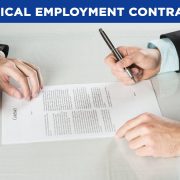Negotiating the Medical Employment Contract – What You Need to Know

It’s both exciting and stressful reviewing your medical practice contract. There are a lot of considerations you may not be familiar with, so we’ve got some best practice guidelines for how to evaluate your employment agreement and ensure it is to your maximum benefit.
Read moreIs the Physician Job Market Shifting to Rural Practice?

With the onset of telehealth and the gap between rural and urban provider salaries contracting, the physician job market is changing. The decision of where to live and practice is an important one that requires careful thought of both your present and future preferences and needs.
Read moreTop Five Reasons to Consider a Career in Healthcare

Though a career in healthcare is hardly ever as glamorous as portrayed on television, it can be just as exciting, satisfying, and humbling. Healthcare is a wonderful field to work in for a multitude of reasons, but among them all, here are the top 5.
Read moreShould You Apply to Positions You Are Under-Qualified For?

You’ve found a job posting, but you’re not so sure you meet the requirements to apply. On one hand you don’t want to miss this opportunity, but on the other you don’t want to waste your time. So the question stands, should you apply? Well, it depends.
Read moreHealth Hazards of Working Nights

It is no surprise that working nights is challenging. However, there are more health hazards associated with night shift than you might be aware of. Let’s explore common health risks that night shift workers face.
Read moreHow to Successfully Change Your Specialty During Residency

Though there are no clear statistics on the exact number, many physicians opt to switch specialties over the course of their career. Some start even earlier and decide to switch during residency. Though it can seem like a daunting process, here are tips on the best way to navigate swapping specialties as a resident.
Read moreHow Important is Emotional Intelligence in Recruitment?

Candidates have the potential to make or break a facility. That’s why it is important for recruiters to utilize emotional intelligence (or EI) in their placement efforts. Emotional intelligence not only helps recruiters ask the right questions, but it also ensures they are self-aware, socially aware, and self-regulating.
Read morePhysician Assistant vs. Nurse Practitioner: Explaining the Difference to Patients

Physician Assistants and Nurse Practitioners are two divergent career paths often mistaken for one another due to their similarities. In reality, they are more similar than different, which makes it even more difficult to understand the distinction between NP’s and PA’s. So this begs the question; what IS the difference?
Read moreHow to Find the Right Recruiter

Healthcare recruiters can play a pivotal role in your career trajectory and helping you find jobs that align with your career goals and personal values. Here are a few things to consider for choosing the right recruiter.
Read moreHow to Adapt When Healthcare Provider Shortages Are Worse Than Ever

Healthcare provider shortages are worse than ever, and demand is only increasing. It’s estimated within the next 4 years that the US will face a deficit of over 3 million workers. Amidst these unprecedented times, healthcare recruiters may need to take a different perspective on staffing solutions in the shrinking talent market.
Read more